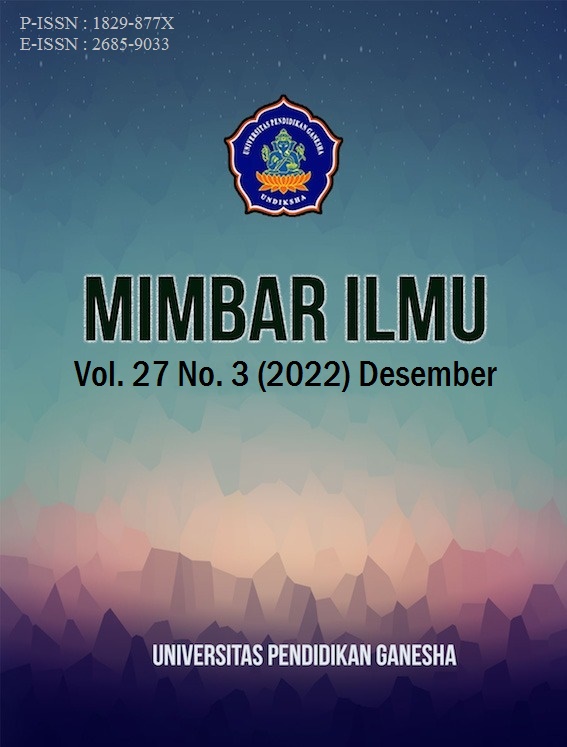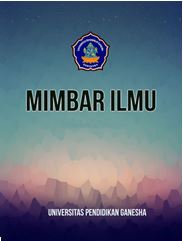English Teacher Identity Crisis after Fruitless Virtual Teaching Practices During Covid-19 Outbreak in Underprivileged Institution
DOI:
https://doi.org/10.23887/mi.v27i3.55375Keywords:
Interpretative phenomenological, professional identity, virtual learningAbstract
Education institutions are under proliferating challenges to deliver successful virtual learning in an increasingly digitized and globalized environment and especially during Covid-19 outbreak. This even become harder in academically challenging circumstance. This might put their identity as a teacher in hard situation. The aim of this research is to analyses English teacher attitudes and perception after having unsuccessful teaching practices from professional identity lens. An interpretative phenomenological analysis by utilizing dialogic interview will be employed to 4 higher education English teacher in underprivileged and newly established university to capture the intended data. After that, the data regarding teacher identity will be displayed and extensively analysed to unfold some individual phenomenon while implementing virtual classroom to teach English. This study found that our participants have evidently grown professionally during the Covid-19 epidemic time frame. Several teachers have developed some strategies to actually engage students in the virtual classroom and gained more awareness of technological issues in learning. In fact, this experience was viewed as enhancing their teacher identity. This study is expected to offer a glimpse of teacher individual situation and some insight on the effort in maintaining personal teachers’ identity during virtual learning process.
References
Albelbisi, N. A., & Yusop, F. D. (2019). Factors influencing learners’ self–regulated learning skills in a maandewssive open online course (MOOC) environment. Turkish Online Journal of Distance Education, 20(3), 1–16. https://doi.org/10.17718/tojde.598191. DOI: https://doi.org/10.17718/tojde.598191
Anspal, T., Leijen, Ä., & Löfström, E. (2019). Tensions and the teacher’s role in student teacher identity development in primary and subject teacher curricula. Scandinavian Journal of Educational Research, 63(5), 679–695. https://doi.org/10.1080/00313831.2017.1420688. DOI: https://doi.org/10.1080/00313831.2017.1420688
Beijaard, D., Meijer, P. C., & Verloop, N. (2004). Reconsidering research on teachers’ professional identity. Teaching and Teacher Education Journal, 20(2), 107–128. https://doi.org/10.1016/j.tate.2003.07.001. DOI: https://doi.org/10.1016/j.tate.2003.07.001
Berry, K. (2020). Anchors away: reconciling the dream of teaching in COVID-19. Communication Education, 69(4), 483–490. https://doi.org/10.1080/03634523.2020.1803383. DOI: https://doi.org/10.1080/03634523.2020.1803383
Bogdan, R., & Biklen, S. (2007). Qualitative research for education: An introduction to theory and methods (5th ed.). Allyn & Bacon.
Bryan, T. K., Lutte, R., Lee, J., O’Neil, P., Maher, C. S., & Hoflund, A. B. (2018). When do online education technologies enhance student engagement? A case of distance education at University of Nebraska at Omaha. Journal of Public Affairs Education, 24(2), 255–273. https://doi.org/10.1080/15236803.2018.1429817. DOI: https://doi.org/10.1080/15236803.2018.1429817
Buabeng-Andoh, C. (2012). Factors influencing teachersâ adoption and integration of information and communication technology into teaching: A review of the literature. International Journal of Education and Development Using ICT, 8(1), 136–155. https://www.learntechlib.org/p/188018/.
Buchanan, R. (2015). Teacher identity and agency in an era of accountability. Teacher and Teaching, 21(6), 700–719. https://doi.org/10.1080/13540602.2015.1044329. DOI: https://doi.org/10.1080/13540602.2015.1044329
Chena, P., Lamberth, A. D., & Guidry, K. R. (2010). Engaging online learners: The impact of Web-based learning technology on college student engagement. Computers & Education, 54(4), 1222–1232. https://doi.org/10.1016/j.compedu.2009.11.008. DOI: https://doi.org/10.1016/j.compedu.2009.11.008
Daniel, S. J. (2020). Education and the COVID-19 pandemic. Prospects, 49(1), 91–96. https://doi.org/10.1007/s11125-020-09464-3. DOI: https://doi.org/10.1007/s11125-020-09464-3
Dobbie, W., & Fryer Jr, R. G. (2011). Are high-quality schools enough to increase achievement among the poor? Evidence from the Harlem Children’s Zone. American Economic Journal: Applied Economics, 3(3), 158–187. https://doi.org/10.1257/app.3.3.158. DOI: https://doi.org/10.1257/app.3.3.158
Donitsa-Schmidt, S. Ramot, R. (2020). Opportunities and challenges : Teacher education in Israel in the covid-19 pandemic. Journal of Education for Teaching International Research and Pedagogy, 46(4), 586–595. https://doi.org/10.1080/02607476.2020.1799708. DOI: https://doi.org/10.1080/02607476.2020.1799708
Engzell, P., Frey, A., & Verhagen, M. D. (2021). Learning loss due to school closures during the COVID-19 pandemic. Proceedings of the National Academy of Sciences, 1–7. https://doi.org/10.1073/pnas.2022376118. DOI: https://doi.org/10.31235/osf.io/ve4z7
Escher, G., Noukakis, D., & Aebischer, P. (2014). Boosting higher education in Africa through shared massive open online courses (MOOCs). In Carbonnier, G., Carton, M., King, K. (Eds), 195–214. https://library.oapen.org/bitstream/handle/20.500.12657/32180/613430.pdf#page=215.
Gedera, D., Williams, J., & Wright, N. (2015). Identifying factors influencing students’ motivation and engagement in online courses. In Motivation, Leadership and Curriculum Design, 13–23. https://link.springer.com/chapter/10.1007/978-981-287-230-2_2. DOI: https://doi.org/10.1007/978-981-287-230-2_2
Gee, J. P. (2000). Chapter 3: Identity as an analytic lens for research in education. Review of Research in Education, 25(1), 99–125. https://doi.org/10.3102/0091732X025001099. DOI: https://doi.org/10.3102/0091732X025001099
Gilad, E., & Alkalay, A. (2014). The gap between role expectations of new teachers and school reality. International Journal of Education and Research, 2(12), 473–486. http://www.ijern.com/journal/2014/December-2014/40.pdf.
Gu, Q., & Day, C. (2007). Teachers resilience: A necessary condition for effectiveness. Teaching and Teacher Education, 23(8), 1302–1316. https://doi.org/10.1016/j.tate.2006.06.006. DOI: https://doi.org/10.1016/j.tate.2006.06.006
Halim, R. E., & Zulkarnain, E. A. U. (2017). The effect of consumer affinity and country image toward willingness to buy. Journal of Distribution Science, 15(4), 15–23. https://doi.org/10.15722/JDS.15.4.201704.15. DOI: https://doi.org/10.15722/jds.15.4.201704.15
Hamman, D., Gosselin, K., Romano, J., & Bunuan, R. (2010). Using possible-selves theory to understand the identity development of new teachers. Teach. Teach. Educ., 26(7), 1349–1361. https://doi.org/10.1016/j.tate.2010.03.005. DOI: https://doi.org/10.1016/j.tate.2010.03.005
Hargreaves, A. (1998). The emotional practice of teaching. Teaching and Teacher Education, 14(8), 835–854. https://doi.org/10.1016/s0742-051x(98)00025-. DOI: https://doi.org/10.1016/S0742-051X(98)00025-0
Hewett, B., & Powers, C. E. (2007). Guest editors’ introduction. Online teaching and learning: Preparation, development, and organizational communication. Technical Communication Quarterly, 16(1), 1–13. https://doi.org/10.1080/ 10572252.2016.1113073. DOI: https://doi.org/10.1080/10572250709336574
Johnson, B., Down, B. (2013). Critically re-conceptualising early career teacher resilience. Discourse: Studies in the Cultural Politics of Education, 34(5), 703–715. https://doi.org/10.1080/01596306.2013.728365. DOI: https://doi.org/10.1080/01596306.2013.728365
Kahu, E. (2013). Framing student engagement in higher education. Studies in Higher Education, 38(5), 758–773. https://doi.org/10.1080/03075079.2011.598505. DOI: https://doi.org/10.1080/03075079.2011.598505
Korpershoek, H., Canrinus, E. T., Fokkens-Bruinsma, M., & de Boer, H. (2020). The relationships between school belonging and students’ motivational, social-emotional, behavioural, and academic outcomes in secondary education: A meta-analytic review. Research Papers in Education, 35(6), 641–680. https://doi.org/10.1080/02671522.2019.1615116. DOI: https://doi.org/10.1080/02671522.2019.1615116
Kwaah, C. Y., Adu-Yeboah, C., Amuah, E., Essilfie, G., & Somuah, B. A. (2022). Exploring preservice teachers’ digital skills, stress, and coping strategies during online lessons amid covid-19 pandemic in Ghana. Cogent Education, 9(1), 2107292. https://doi.org/10.1080/2331186X.2022.2107292. DOI: https://doi.org/10.1080/2331186X.2022.2107292
Labaree, D. F. (2000). On the nature of teaching and teacher education: Difficult practices that look easy. Journal of Teacher Education, 51(3), 228–233. https://doi.org/10.1177/0022487100051003011. DOI: https://doi.org/10.1177/0022487100051003011
Lampert, M. (1985). How do teachers manage to teach? Perspectives on problems in practice. Harvard Educational Review, 55(2), 178–195. https://doi.org/10.17763/haer.55.2.56142234616x4352. DOI: https://doi.org/10.17763/haer.55.2.56142234616x4352
Leacock, C. J., & Warrican, S. J. (2020). Helping teachers to respond to COVID-19 in the Eastern Caribbean: issues of readiness, equity and care. Journal of Education for Teaching, 46(4), 576–585. https://doi.org/10.1080/02607476.2020.1803733. DOI: https://doi.org/10.1080/02607476.2020.1803733
Letzel, V., Pozas, M., & Schneider, C. (2020). Energetic students, stressed parents, and nervous teachers: A comprehensive exploration of inclusive homeschooling during the COVID-19 crisis. Open Education Studies, 2(1), 159–170. https://doi.org/10.1515/edu-2020-0122. DOI: https://doi.org/10.1515/edu-2020-0122
Lisa, E. K., Rowena, L., & Kathryn, A. (2021). Teachers’ narratives during COVID-19 partial school reopenings: An exploratory study. Educational Research, 63(2), 244–260. https://doi.org/10.1080/00131881.2021.1918014. DOI: https://doi.org/10.1080/00131881.2021.1918014
Miller, A., & Young-Jones, A. D. (2012). Academic integrity: Online classes compared to face-to-face classes. Journal of Instructional Psychology, 39(3). http://people.missouristate.edu/ardenmiller/swpa12.pdf.
Moody, J. (2004). Distance education: Why are the attrition rates so high? The Quarterly Review of Distance Education, 5(3), 205–210. https://search.proquest.com/openview/16038b494dda82cd5c843ab5c45a1244/1?pq-origsite=gscholar&cbl=29705.
Müller, F. A., & Wulf, T. (2020). Technology-supported management education: a systematic review of antecedents of learning effectiveness. International Journal of Educational Technology in Higher Education, 17(1). https://doi.org/10.1186/s41239-020-00226-x. DOI: https://doi.org/10.1186/s41239-020-00226-x
Noori, A. Q., Said, H., Nor, F. M., & Ghani, F. A. (2020). The relationship between university lecturers’ behaviour and students’ motivation. Universal Journal of Educational Research, 8(11), 15–22. https://doi.org/10.13189/ujer.2020.082303. DOI: https://doi.org/10.13189/ujer.2020.082303
Novikov, P. (2020). Impact of COVID-19 emergency transition to on-line learning onto the international students’ perceptions of educational process at Russian university. Journal of Social Studies Education Research, 11(3), 270–302. https://www.learntechlib.org/p/217752/.
Onyema, E. M., Chika, E. N., Ayobamidele, O. F., Sen, S. S., Grace, A. F., Aabha, S., & Omar, A. A. (2020). Impact of Coronavirus Pandemic on Education. Journal of Education and Practice, 11(13), 108–121. https://doi.org/10.7176/jep/11-13-12. DOI: https://doi.org/10.7176/JEP/11-13-12
Ozanne, J. L., & Saatcioglu, B. (2008). Participatory action research. Journal of Consumer Research, 35(3), 423–439. https://doi.org/10.1086/586911. DOI: https://doi.org/10.1086/586911
Panayiotou, M., Humphrey, N., & Wigelsworth, M. (2019). An empirical basis for linking social and emotional learning to academic performance. Contemporary Educational Psychology, 56, 193–204. https://doi.org/10.1016/j.cedpsych.2019.01.009. DOI: https://doi.org/10.1016/j.cedpsych.2019.01.009
Papastylianou, A., M., & Polychronopoulos, K. M. (2009). Teachers’ Burnout, Depression, Role Ambiguity and Conflict. Social Psychology of Education: An International Journal, 12(3), 295–314. https://doi.org/10.1007/s11218-008-9086-7. DOI: https://doi.org/10.1007/s11218-008-9086-7
Perrotta, K. A., & Bohan, C. H. (2020). A Reflective Study of Online Faculty Teaching Experiences in Higher Education. Journal of Effective Teaching in Higher Education, 3(1), 50–66. https://doi.org/10.36021/ jethe.v3i1.9. DOI: https://doi.org/10.36021/jethe.v3i1.9
Pozo, J. I., Pérez Echeverría, M. P., Cabellos, B., & Sánchez, D. L. (2021). Teaching and learning in times of COVID-19: uses of digital technologies during school lockdowns. Frontiers in Psychology, 12, 1511. https://doi.org/10.3389/fpsyg.2021.656776. DOI: https://doi.org/10.3389/fpsyg.2021.656776
Price, A., Mansfield, C., & McConney, A. (2012). Considering ‘teacher resilience’from critical discourse and labour process theory perspectives. British Journal of Sociology of Education, 33(1), 81–95. https://doi.org/10.1080/01425692.2011.614748. DOI: https://doi.org/10.1080/01425692.2011.614748
Reeves, J. (2018). Teacher identity. In John I. L, Ed., The TESOL Encyclopedia of English Language Teaching. https://doi.org/10.1002/9781118784235.eelt0268. DOI: https://doi.org/10.1002/9781118784235.eelt0268
Renes, S. L., & Strange, A. T. (2010). Using Technology to Enhance Higher Education. Innovative Higher Education, 36(3), 203–213. https://doi.org/10.1007/s10755-010-9167-3. DOI: https://doi.org/10.1007/s10755-010-9167-3
Rodgers, C. R., & Scott, K. H. (2008). The development of the personal self and professional identity in learning to teach. Handbook of research on teacher education. In Cochran-Smith, M., Feiman-Nemser, S. McIntyre, D. J., and Demers, K. E (Eds.), 732–755. https://www.taylorfrancis.com/chapters/edit/10.4324/9780203938690-85/development-personal-self-professional-identity-learning-teach-carol-rodgers-katherine-scott.
Savin-Baden, M., Gourlay, L., Tombs, C., Steils, N., Tombs, G., & Mawer, M. (2010). Situating pedagogies, positions and practices in immersive virtual worlds. Educational Research, 52(2), 123–133. https://doi.org/10.1080/00131881.2010.482732. DOI: https://doi.org/10.1080/00131881.2010.482732
Shahroom, A. A., & Hussin, N. (2018). Industrial Revolution 4.0 and Education. International Journal of Academic Research in Business and Social Sciences, 8(9). https://doi.org/10.6007/ijarbss/v8-i9/4593. DOI: https://doi.org/10.6007/IJARBSS/v8-i9/4593
Stevens, J. A., & Kincaid, J. P. (2015). The relationship between presence and performance in virtual simulation training. Open Journal of Modelling and Simulation, 3(2), 41–48. https://doi.org/10.4236/ojmsi.2015.32005. DOI: https://doi.org/10.4236/ojmsi.2015.32005
Sutton, R. E., & Wheatley, K. F. (2003). Teachers’ emotions and teaching: A review of the literature and directions for future research. Educational Psychology Review, 15(4), 327–358. https://doi.org/10.1023/a:1026131715856. DOI: https://doi.org/10.1023/A:1026131715856
Thannimalai, R., & Raman, A. (2018). Principals technology leadership and teachers technology integration in the 21st century classroom. International Journal of Civil Engineering and Technology, 9(2), 177–187. https://www.academia.edu/download/56075554/IJCIET_09_02_018.pdf.
Valente, S., Lourenço, A. A., Alves, P., & Dominguez-Lara, S. (2020). The role of teacher’s emotional intelligence for efficacy and classroom management. Revista CES Psicología, 13(2), 18–31. https://doi.org/10.21615/cesp.13.2.2. DOI: https://doi.org/10.21615/cesp.13.2.2
Widin, J., Yasukawa, K., & Chodkiewicz, A. (2012). Teaching practice in the making: Shaping and reshaping the field of adult language, literacy and numeracy teaching. Australian Journal of Adult Learning, 52(1), 9–38. https://doi.org/10.3316/informit.423777907530253.
Wolff, D., & De Costa, P. I. (2017). Expanding the language teacher identity landscape: An investigation of the emotions and strategies of a NNEST. The Modern Language Journal, 101(1), 76–90. https://doi.org/10.1111/modl.12370. DOI: https://doi.org/10.1111/modl.12370
Downloads
Published
How to Cite
Issue
Section
License
Copyright (c) 2022 Wiramarta Kadek, Dewi, Ni Putu Dian Utami

This work is licensed under a Creative Commons Attribution-ShareAlike 4.0 International License.
This work is licensed under a Creative Commons Attribution-ShareAlike 4.0 International License.
Authors who publish with this journal agree to the following terms:
- Authors retain copyright and grant the journal right of first publication with the work simultaneously licensed under a Creative Commons Attribution License that allows others to share the work with an acknowledgment of the work's authorship and initial publication in this journal.
- Authors are able to enter into separate, additional contractual arrangements for the non-exclusive distribution of the journal's published version of the work (e.g., post it to an institutional repository or publish it in a book), with an acknowledgment of its initial publication in this journal.
- Authors are permitted and encouraged to post their work online (e.g., in institutional repositories or on their website) prior to and during the submission process, as it can lead to productive exchanges, as well as earlier and greater citation of published work.








